| Srl | Item |
| 1 |
ID:
079217
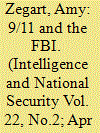

|
|
|
|
|
| Publication |
2007.
|
| Summary/Abstract |
Public discussion about the 11 September 2001 terrorist attacks has focused on the human causes of tragedy - on individual mistakes, failures of leadership, and the power plays between intelligence officers in the field and policymakers in Washington. But closer examination of the FBI suggests that organizational weaknesses are the root cause of poor agency performance. Longstanding deficiencies in the FBI's organizational structure, culture, and incentive systems proved crippling in the 1990s, when the Cold War ended and the terrorist threat emerged. These lingering weaknesses ultimately prevented the bureau from capitalizing on 12 separate opportunities that might have disrupted the 9/11 plot
|
|
|
|
|
|
|
|
|
|
|
|
|
|
|
|
| 2 |
ID:
051550
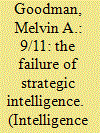

|
|
|
| 3 |
ID:
191087
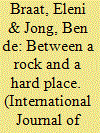

|
|
|
|
|
| Summary/Abstract |
While scholarly literature has paid attention to human intelligence professionalism from the perspective of the agent handler, we know relatively little about the precarious positions in which (double) agents often find themselves and what their ensuing needs from their handlers consist of. This article suggests that (double) agents desire a reciprocal, affect-based relationship with their handlers, involving trust and gratitude, more than just a negotiated relationship based on (financial) agreements. This article explains the importance of such a relationship. The main source of this research consists of original, in-depth oral history interviews with former double agent “M.” He operated from the 1960s through the 1990s for the Dutch Security Service and the Central Intelligence Agency against the East German Ministerium für Staatssicherheit. The article analyzes the varying degrees of appreciation that these services showed for his work, and it investigates their consequences on the psychological well-being of the double agent.
|
|
|
|
|
|
|
|
|
|
|
|
|
|
|
|
| 4 |
ID:
064866
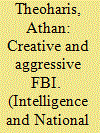

|
|
|
| 5 |
ID:
129624
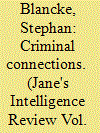

|
|
|
| 6 |
ID:
139895
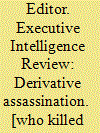

|
|
|
|
|
| Edition |
1st ed.
|
| Publication |
New York, New Benjamin Franklin House, 1985.
|
| Description |
xv, 266p.pbk
|
| Standard Number |
933488432
|
|
|
|
|
|
|
|
|
|
|
|
Copies: C:1/I:0,R:0,Q:0
Circulation
| Accession# | Call# | Current Location | Status | Policy | Location |
| 025864 | 954.052/EDI 025864 | Main | On Shelf | General | |
|
|
|
|
| 7 |
ID:
103705
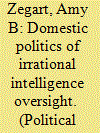

|
|
|
| 8 |
ID:
130231
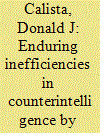

|
|
|
|
|
| Publication |
2014.
|
| Summary/Abstract |
A lot of time we are chasing shadows, but it's better to do that than find out later you let something get by. (An FBI field agent-Type I Error or a false positive). 1
The best chance for success [terrorists] have is to get somebody who is not a visitor [to] come in as a permanent resident or citizen, who knows the culture and how to move around, who doesn't have a record, so as not to get picked up by a database. (A former senior U.S. intelligence official-Type II Error or a false negative). 2
These two citations reflect divergent responses to the governance structures of terror organizations that continue to be subjects of interest and debate among scholars and practitioners. The operational character of terrorism remains essential to the development of strategic initiatives by counterintelligence (CI) agencies. To position CI more advantageously certain concepts from New Institutional Economics (NIE) might be utilized. 3 NIE's central formulation of principals and agents assumes that people make rational choices in determining whether to plan their transactions (relationship costs) into one of two kinds of configurations: market (decentralized) versus non-market (centralized) endeavors. Effectively, the challenge is to determine which transactional method offers greater prospects to achieve efficiency. Inherent limitations (externalities) of time, place and resources complicate these choices. Those involved can be divided into owners (principals) and workers or suppliers (agents). In fulfilling any agreed upon duties, transaction costs then center on the degree to which principals undertake monitoring the behavior of agents for possible shirking-referenced by NIE as the "agency problem."
|
|
|
|
|
|
|
|
|
|
|
|
|
|
|
|
| 9 |
ID:
150417
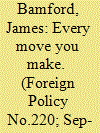

|
|
|
| 10 |
ID:
129115
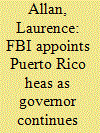

|
|
|
| 11 |
ID:
032302
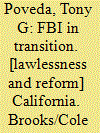

|
|
|
|
|
| Publication |
California, Brooks/Cole Publishing Company, 1990.
|
| Description |
xvi, 202p.
|
| Series |
Contemporary issues in crime and justice series
|
| Standard Number |
0534128823
|
|
|
|
|
|
|
|
|
|
|
|
Copies: C:1/I:0,R:0,Q:0
Circulation
| Accession# | Call# | Current Location | Status | Policy | Location |
| 031835 | 353.0074/POV 031835 | Main | On Shelf | General | |
|
|
|
|
| 12 |
ID:
116160
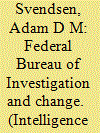

|
|
|
|
|
| Publication |
2012.
|
| Summary/Abstract |
In this article, shortcomings with US domestic counter-terrorism intelligence and associated efforts since 2000 are analysed. Potential suggestions for the extended development of the Federal Bureau of Investigation (FBI) are then discussed. Some of these propositions touch on developments involving the domestic intelligence and security services of other countries, and explore their use concerning the future optimization of the FBI in the area of domestic counter-terrorism intelligence. Within the overall culture and operational approach of the FBI, today greater sustained emphasis still needs to be accorded to the 'intelligence methodology' of 'wait and watch'. Simultaneously, the FBI needs to keep moving more from mainly a post facto emphasis to more of an a priori one in its investigations. Thereby, the FBI can continue to move towards improved delivery and better meet its role as a guarantor of US national security in a timely manner as the twenty-first century progresses.
|
|
|
|
|
|
|
|
|
|
|
|
|
|
|
|
| 13 |
ID:
171252
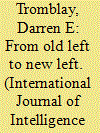

|
|
|
| 14 |
ID:
047535


|
|
|
|
|
| Publication |
Shrewbury (England), Airlife Publishing Ltd., 1997.
|
| Description |
272p.Hbk
|
| Standard Number |
1853108790
|
|
|
|
|
|
|
|
|
|
|
|
Copies: C:1/I:0,R:0,Q:0
Circulation
| Accession# | Call# | Current Location | Status | Policy | Location |
| 043238 | 923.543/SIM 043238 | Main | On Shelf | General | |
|
|
|
|
| 15 |
ID:
021517
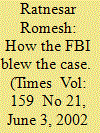

|
|
|
|
|
| Publication |
June 3, 2002.
|
| Description |
21-32
|
|
|
|
|
|
|
|
|
|
|
|
|
|
|
|
| 16 |
ID:
059126
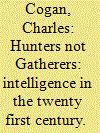

|
|
|
| 17 |
ID:
137581
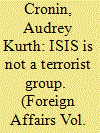

|
|
|
|
|
| Summary/Abstract |
After 9/11, many within the U.S. national security establishment worried that, following decades of preparation for confronting conventional enemies, Washington was unready for the challenge posed by an unconventional adversary such as al Qaeda. So over the next decade, the United States built an elaborate bureaucratic structure to fight the jihadist organization, adapting its military and its intelligence and law enforcement agencies to the tasks of counterterrorism and counterinsurgency.
|
|
|
|
|
|
|
|
|
|
|
|
|
|
|
|
| 18 |
ID:
149467
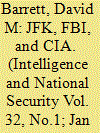

|
|
|
|
|
| Summary/Abstract |
On 26 July 1962, the New York Times published a front-page story by reporter Hanson Baldwin which, among many things, showed the vulnerability of Soviet land-based missiles, in the event of a first strike by the US. Drawing at least indirectly from a National Intelligence Estimate, it also showed how US intelligence had obtained that information. The story infuriated President John F. Kennedy, who believed it harmed the security of the United States. This article details an aggressive FBI investigation of who had leaked to Baldwin, as well as an initiative at the Central Intelligence Agency to conduct its own future leak investigations inside the US, both authorized by President Kennedy.
|
|
|
|
|
|
|
|
|
|
|
|
|
|
|
|
| 19 |
ID:
022143
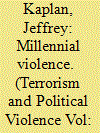

|
|
|
|
|
| Publication |
2002.
|
| Description |
1-300
|
|
|
|
|
|
|
|
|
|
|
|
|
|
|
|
| 20 |
ID:
111620
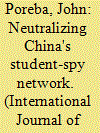

|
|
|